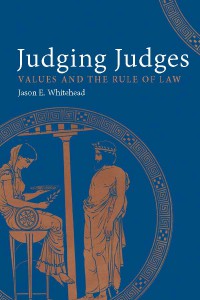Jason Whitehead — My Research
Jason Whitehead — My Research
Christianity and Law
My current research interests lie at the intersection of legal theory, judicial decision making, and Christian legal activism. Most recently, I published an article in the journal, Narrative Works, entitled “Dangerous Stories: Narrative Theory and Critique in a Post-Truth World.” It centers on the dilemma faced by narrative scholars, whose philosophical commitments prevent them from inquiring into objective truth but who nevertheless seek to challenge the lies and misinformation spread by Christian conservatives during the Trump era. The article reviews the strategies other narrative scholars in Critical Race Theory and Critical Feminist Theory have used to navigate this dilemma, and it argues that these strategies could also help scholars of Christian nationalism and other Trump-era movements achieve their goals without sacrificing intellectual rigor. Before that, I published an article in the Journal of Law & Religion, entitled “Tool or Lens? Worldview Theory and Christian Conservative Legal Activism.” The article traces the intellectual history of the concept of “worldview,” critiques the way this concept is employed by Christian conservative legal organizations and activists as a “tool” to achieve legal and social victories, and defends an alternative understanding of worldview as a socially constructed “lens.” I also published an article in the Tulsa Law Review, entitled “Faith, Reason, and Liberal Legal Neutrality,” critiquing the supposed value neutrality of liberal political and theory and defending a personalist understanding of religiously motivated legal claims in the secular legal arena.
I am working on a book tentatively titled, “The Law of the Lord: Mapping the Legal Worldview of Christian Conservatives.” As the title suggests, I am trying to describe and analyze the way Christian theological and social views translate into legal views on issues such as same-sex marriage, religious conscience exemptions, and abortion. This book will build on several papers I have presented at scholarly conferences over the past few years. 
Judicial Philosophy
“The Law of the Lord” builds on the foundation I laid in my first book “Judging Judges: Values and the Rule of Law,” which described and analyzed the professional, social, and personal values that motivate judges when they interpret law. “Judging Judges” was the culmination of several years of research, including some papers presented at various academic conferences. In fact, my interest in these issues goes all the way back to my days in graduate school, where I studied political theory, public law, and American politics, with a special emphasis on post-positivist legal theory and New Institutionalist studies of judicial decision making.
Legal History
Before getting into the research for the above book, my scholarship focused on legal history — specifically, the motivations of claimaints bringing major constitutional cases and the public response to those cases. See the following links for a better idea what I was up to during this stage of my career: “Wallace v. Jaffree” in Mel Urofsky, Ed., The Public Debate Over Controversial Supreme Court Decisions, Washington, D.C.: Congressional Quarterly Press (2006) “Robert Mack Bell: The Ultimate Civil Rights Success Story,” in Mel Urofsky, Ed., One Hundred Americans Making Constitutional History. Washington D.C.: Congressional Quarterly Press (2004). “Ishmael Jaffree: A Passion for Non-Conformity,” in Mel Urofsky, Ed., One Hundred Americans Making Constitutional History. Washington D.C.: Congressional Quarterly Press (2004).
Critical Legal Theory
My earliest research — some of it published when I was a law student and an attorney — was greatly influenced by radical left-wing theories. I was especially interested in applying Frankfurt School critical theory to the law, and I was convinced that getting back to the roots of critical theory in this way could revive and enliven the Critical Legal Studies movement. See the following links for this scholarship: “Toward a Critical Theory of the Rule of Law: William E. Scheuerman’s ‘Between the Norm and the Exception,’” Oklahoma City University Law Review 26 (summer 2001): 663-91. “From Criticism to Critique: Preserving the Radical Potential of Critical Legal Studies Through a Reexamination of Frankfurt School Critical Theory,” Florida State University Law Review 26 (Spring 1999): 701-42. “The Labor Exemption From Antitrust as an Ideological Antinomy,” Willamette Law Review 32 (Fall 1996): 881-919.
